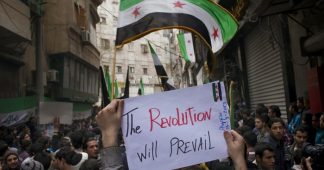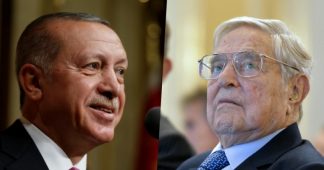By Kit Klarenberg
Jul 9, 2021
photo: © Reuters / Toby Melville
Millions was spent clandestinely setting up and paying a network of ‘journalists’ to pump out anti-Assad, pro-opposition content as directed by a shadowy firm run by the UK foreign intelligence service’s counter-terrorism ex-head.
In July 2019, an arresting image of two young Syrian girls entombed in rubble in opposition-occupied Idlib attempting to haul their sister to safety as she dangled off the precipice of a bombed out building, their panic-stricken father looking on from above, went viral the world over.
The photo, disseminated by Syrian news service SY24, subsequently featured in countless Western media outlets, and was even discussed during a United Nations Security Council session. What very few knew however, was SY24 was created and funded by The Global Strategy Network, founded by Richard Barrett, a former MI6 Director of Global Counter Terrorism Operations. The photo had been taken by one of the firm’s trained “stringers” across Syria, who were charged with creating “wildly impactful” and “engaging” content for “defined target audiences” both inside and outside the country.
Global Strategy is one of several contractors bankrolled and directed by the UK Foreign Office to conduct information warfare operations in Syria over the grinding course of the decade-long crisis. These efforts, costing millions annually, sought to destabilize the government of Bashar Assad, convince Syrians, Western citizens, foreign states, and international bodies that the Free Syrian Army was a legitimate, “moderate” alternative, and flood media the world over with pro-opposition propaganda.
Leaked files indicate that the company’s “core Syria media team” has been working in the country “since the earliest days of the revolution” – and boasts of their work being “wildly (sic) impactful” on perceptions internationally. A cited example of its cloak-and-dagger work in practice was a wide-ranging psyop launched in the wake of Iranian General Qasem Soleimani’s murder via US drone in January 2020, which “significantly shifted the ongoing conversation around Syria and Iran.”
The team “coordinated their in-country network and remote media production,” and created a video showing citizens of Aleppo handing out sweets in celebration within mere hours of his death. The clip was purportedly retweeted by prominent activists and journalists “in and beyond Syria,” including then-US Secretary of State Mike Pompeo, and picked up by TV station Al-Arabiyya, in the process being broadcast “to its 22.5 million followers.”
Global Strategy also boasted in classified documents that media brands it founded had over one million followers in Syria and the UK, their output generating “huge global coverage” and being seen by “many hundreds of millions of people.” The “powerful moderate platforms” were allegedly among “very few” covering developments in opposition-occupied Idlib, using a variety of equipment, such as cameras and video editing software, provided by the company.
The company’s news outlets and constellation of citizen journalists was said to constitute a clandestine “network of networks”, enabling the firm to “drive stories into the mainstream,” and its own staff were described as “key influencers in their own right,” appearing “several times per week” on TV channels such as Al Jazeera and BBC Arabic. Global Strategy’s relationship with these stations meant it could “place video footage at no cost” while “[drawing] attention” to “project content and campaigns.”
One such campaign was to “contest local extremist narratives” and undermine the “ideology, brand, propaganda and global influence” of terrorist groups in Syria, conducted for the Foreign Office’s Counter-Daesh Communications Cell. Under its auspices, Global Strategy proposed running a number of “community activities” in order to surreptitiously extol the values of democracy, equality, and non-violence to Syrians young and old.
In service of the initiative, the contractor would design and deliver community plays, computer literacy workshops, mobile cinema events – selected screenings to include “prosocial cartoons for children” – and sporting tournaments, which “[took] into account the rapidly changeable security situation, and the need for gender inclusion.” It had “already held football tournaments in northwest Syria” that brought together “a wide variety of local stakeholders and actors,”and were covered by Al Jazeera.
Central to these events would be a number of “current inhabitants and prisoners” of the Autonomous Administration of North Eastern Syria, “including former Daesh members from both Syria and abroad,” to which Global Network had access as a result of its work with the European Institute for Peace. This “invaluable resource” meant ex-fighters could “talk back to the communities from which they came and dispel Daesh-driven myths about the realities of the Caliphate.”
The need to conceal the Foreign Office’s role in these endeavors was paramount, with Global Strategy pledging that nothing would publicly link them with the Counter-Daesh Communications Cell. A number of civil society organizations in Syria and the UK would appear to be the ultimate sponsors of these enterprises to mitigate the risk of exposure, and “media lines” would be agreed with its local partners in the event London’s hidden hand was revealed.
It’s uncertain whether these grassroots groups, such as Syria Solidarity, are aware that Global Strategy exploited them as “buffers” in this manner, an urgent question indeed given that a secret internal review of the Cell’s covert activities concluded they were “poorly planned, probably illegal and cost lives.”
It’s not the first time Global Strategy’s chief Richard Barrett has been in close proximity to, if not outright embroiled in, illegal operations that led to people dying. He was in charge of MI6’s counter terror operations before and after 9/11, a period in which the UK’s foreign intelligence agency became heavily involved in Washington’s extraordinary rendition program, under which suspected terrorists were abducted, extradited overseas, and interrogated under torture.
Five days after the attacks, a team of senior British officials were briefed directly by the CIA’s counter terror chief Cofer Black on the strategy in detail. His MI6 counterpart, Mark Allen, reportedly said the plan sounded “rather blood curdling”, to which Black apparently responded, “we’ll probably all be prosecuted.”
Despite Allen’s reservations, London quickly became an enthusiastic collaborator in extraordinary rendition. A 2018 report issued by Parliament’s Intelligence and Security Committee found that between 2001 and 2010, UK security services shared an “unprecedented” amount of intelligence with foreign liaison agencies “to facilitate the capture of detainees” when it was known or “reasonably suspected” the individuals would be subject to torture, and identified 198 cases in which UK spies received intelligence from obtained from people “they knew or ought to have suspected” had been tortured.
From 2002–2004, representatives of MI6 also participated in interrogations of detainees held by US authorities at locations in Afghanistan, Iraq, and Guantanamo Bay, with the Committee identifying 13 cases of UK intelligence personnel witnessing detainee torture first-hand.
In all, there were 128 recorded incidents of UK agencies being informed by their foreign counterparts that prisoners had been mistreated. London was found to have offered financial inducements to others to conduct extraordinary rendition operations, and suggested, planned or agreed to rendition operations proposed by others in 28 cases
These figures no doubt vastly underestimate the scale of MI6’s complicity in torture. The Committee avowedly published its report despite the investigation being incomplete, stating in the introduction that “it is not, and must not be taken to be, a definitive account,” as “the terms and conditions were such that we would be unable to conduct an authoritative inquiry and produce a credible report.”
Parliamentarians were significantly hampered in their probe by then-Prime Minister Theresa May imposing onerous restrictions, including denying access to officers and personnel involved, and key witnesses, meaning only four intelligence agency staff could be interviewed – and even they weren’t allowed to comment on specific cases.
Barrett left MI6 in 2004, and then for nine years led the UN Monitoring Team concerning al-Qaeda and the Taliban. In June, he stepped down from Global Strategy for reasons that are unclear, although it surely wasn’t for fear of Cofer Black’s dire prophecy coming true – the UK Crown Prosecution Service has consistently refused to institute legal proceedings against MI6 officials for their complicity in extraordinary rendition, despite police handing over 28,000 pages of evidence in one case alone.
RT approached Global Strategy Network for comment on this story, but had received no reply by time of publication.
* Kit Klarenberg, is an investigative journalist exploring the role of intelligence services in shaping politics and perceptions. Follow him on Twitter @KitKlarenberg
Published at www.rt.com











